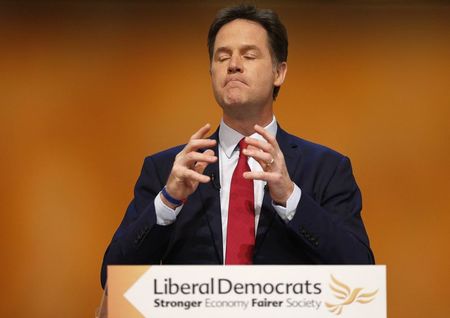By Kylie MacLellan
GLASGOW Scotland (Reuters) - Since partnering with Prime Minister David Cameron's Conservatives in 2010, the junior party in Britain's first coalition government since World War Two has watched its opinion poll ratings slump.
The Liberal Democrats have been hammered in local, parliamentary and European elections and pollsters predict they could lose around half their 56 lawmakers in the 2015 vote. Yet they could still hold the balance of power.
Polls show voters remain unconvinced of the opposition Labour party's ability to handle the economy or its leader Ed Miliband's image, while support for the Conservatives has been hit by its austerity measures and the fact many Britons are yet to see the benefits of a return to economic growth.
Last week Cameron's party took their first opinion poll lead in more than two years, but with both the main parties regularly polling 30-35 percent each, the race is expected to be close.
The Liberal Democrats were contemplating their options as they gathered for their annual conference this week and while the official position is that they would take their cue from voters and hold talks with whoever wins the most seats, opinion over who they would prefer to work with was split.
One thing was clear however, they would not go into coalition at any cost.
This time -- without the pressure financial market jitters over dealing with Britain's record peacetime budget deficit placed on forming a stable government in 2010 -- whoever wins the most votes could attempt to govern as a minority.
Liberal Democrat leader Nick Clegg and his party, scarred by a public backlash after it reneged on promises such as scrapping university tuition fees, may be willing to let that happen if they cannot get a deal they are happy with in any negotiations.
"Leaving a minority administration, which is not to my preference I must say, is not the horror story it would have been four and a half years ago," said party president Tim Farron, tipped as a potential successor to Clegg.
"We mustn't be so dogged that we let the opposition think that (coalition) is what we will take at any length."
The Liberal Democrats are not keen on any arrangement that would see them agree to back a minority government on key votes without being in power, asking what is in it for them?
NEITHER A PERFECT PARTNER
Clegg has sought to persuade voters of the need to keep his party in government after May's election by painting them as a restraint on the extremes of left and right.
"We are left in a situation where anything is possible. A coalition with either the Conservatives or the Labour party has question marks, has risks. Neither is a perfect partner," said Julie Smith, a local councillor in Cambridge and a member of Britain's upper house of parliament.
Many within the party see centre-left Labour as a closer ideological fit. They have a similar pro stance on Britain's membership of the European Union and favour more progressive taxation, including plans to tax wealthy homeowners.
A poll of more than 550 members by party supporters' website Liberal Democrat Voice at the start of this month found 33 percent favoured a coalition with Labour, compared to just 14 percent who wanted to work with the Conservatives again.
Yet lawmakers highlight major differences of policy on issues such as civil liberties and, like the voters, some see Miliband's image and poor personal poll ratings as a barrier.
"I don't see Ed Miliband as a prime minister," Liberal Democrat junior minister Norman Lamb said at an event on the sidelines of the Glasgow conference, to applause from attendees.
Due to quirks of Britain's electoral system, Labour could win the most seats without attracting the highest percentage share of votes. If the Liberal Democrats, languishing fourth in opinion polls, were to partner with Miliband's party in that situation, it would be "very hard to sustain", he said.
"The idea of us being latched into a Labour government with a low percentage of the vote, led by Miliband ... it could be enormously damaging for our party," he said.
LURCH TO THE RIGHT
Despite several senior Liberal Democrats making strong attacks on their coalition partners during conference speeches this week, some think the current set-up could endure.
Many members felt the reputational hit of going into coalition with the Conservatives had been worth the opportunity to get some Liberal Democrat policies enacted.
"If the coalition was standing in the general election in May, in my view it would win comfortably ... people would vote for this government to continue if that was an option on the ballot paper," Liberal Democrat lawmaker and former minister Jeremy Browne told the BBC's Sunday Politics show.
But continuing with the Conservatives also has its problems.
Under pressure from Eurosceptics in his own party and the rise of the anti-EU UK Independence Party, Cameron has promised a referendum on Britain's EU membership in 2017 and threatened to quit the European Court of Human Rights unless Britain's parliament is given the final say over its rulings.
Last week Clegg said he would not be part of a government which took Britain out of the human rights court, and some in his party feel their coalition partners have gone too far in a bid to win over UKIP voters they fear could split the centre-right vote and damage their re-election chances.

"I wanted a coalition in 2010, I liked the idea of economic credentials with a conscience," said one Liberal Democrat member at the conference who declined to be named. "Not anymore, the Conservatives have lurched too far to the right."
(Editing by Janet Lawrence)
